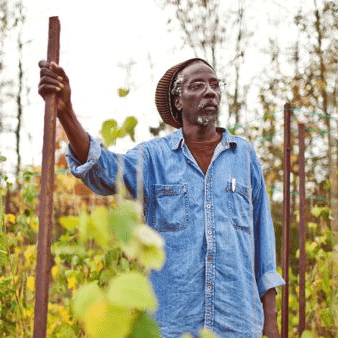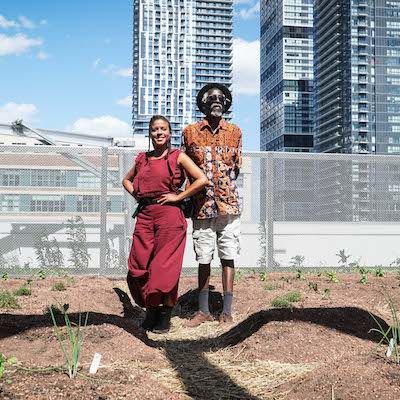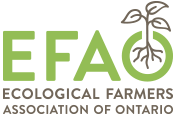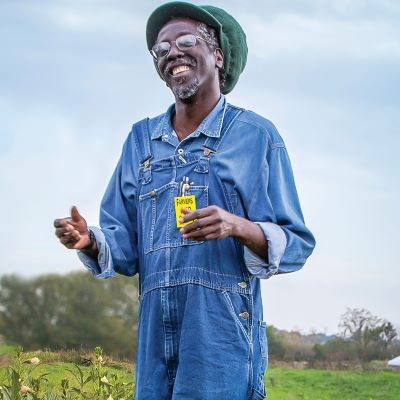EFAO Board Member Anan Lololi is the Chair of the Black Food Sovereignty Working Group, an initiative of Afri-Can FoodBasket that emerged when the organization began working with the City of Toronto’s Confronting Anti-Black Racism Unit (CABR) to create The Toronto Black Food Sovereignty Plan.
With 27 years of experience working in the non-profit sector as an Urban Farmer and Canadian Food Systems Analyst, Anan’s passion is championing Black Food Sovereignty and advocating for low-income communities. In 1995 Anan co-founded Afri-Can FoodBasket (AFB) and was also a member of the Toronto Food Policy Council (TFPC) from 2001-2009.
Tell us a little about yourself as a grower and food justice leader. What led you to the current point in your career?
I was born in Georgetown, Guyana on the North coast of the Amazon. It was a wonderful food experience growing up with abundant vegetables like amaranth, cassava, bitter melon, fruits like sapodilla, all kinds of mangos, cashew pear, genip, awara, and sugar apple. When I came to Canada in the late 70s I got a gig with the band Truths and Rights at a non-profit organiztion called ImiCan in Regent Park, and we were the best reggae band in Canada for nearly a decade. My food justice career was born in that Afro-centric community with a sense that “you have to do for self.” My work with youth is African-centred. Cultural roots are important for youth and some of that gets misplaced because of colonization. You have to know where you came from.
 In the early 90s, after graduating from Centennial College in Toronto, I planned to open a vegan “ital” restaurant — I’ve been vegan for 45 years. The Rastafari Nyabinghi diet is a plant-based diet we refer to as ital livity, spiritually connected to the earth. Ital means to live naturally off the land: organic, free from additives. Ital is vital. I also received a small grant from the Ontario government to support food security in my community. That was the beginning of our consumer cooperative food buying club, Afri-Can Food Basket, which grew in partnership with FoodShare. We purchased culturally appropriate fresh food, packed it with help from volunteers, then distributed it to low income community members — for over 11 years. Black families remain 3.5 times more likely to be food insecure than white families; 37 percent of Black children live in food insecure households in Toronto. In the first year of the pandemic alone, we delivered over 200,000 pounds of food to low-income Black families in the greater Toronto Area.
In the early 90s, after graduating from Centennial College in Toronto, I planned to open a vegan “ital” restaurant — I’ve been vegan for 45 years. The Rastafari Nyabinghi diet is a plant-based diet we refer to as ital livity, spiritually connected to the earth. Ital means to live naturally off the land: organic, free from additives. Ital is vital. I also received a small grant from the Ontario government to support food security in my community. That was the beginning of our consumer cooperative food buying club, Afri-Can Food Basket, which grew in partnership with FoodShare. We purchased culturally appropriate fresh food, packed it with help from volunteers, then distributed it to low income community members — for over 11 years. Black families remain 3.5 times more likely to be food insecure than white families; 37 percent of Black children live in food insecure households in Toronto. In the first year of the pandemic alone, we delivered over 200,000 pounds of food to low-income Black families in the greater Toronto Area.
By 2006 we had established Ujamaa Farm in partnership with the City of Toronto Community Garden Program, guided by my Urban Agriculture mentor, Solomon Boye. Due to budget cuts, the program disbanded and a new partnership was established in 2011, with Everdale Farm & FoodShare. This collective was now called Black Creek Urban Farm. AFB Ujamaa Farm is an African-centred youth leadership food justice program combining urban ag training and tech support for community projects. Young people access their food by growing their food. Callaloo is one of the most popular crops with youth around Jane and Finch, Regent Park, Lawrence Heights, and Rexdale. Just the newness of the experience of farming is almost more important than the food itself. Some of the youth we work with were impacted by gang violence, sometimes from opposing gangs, like the Bloods and Crips. We brought them together safely and successfully, through urban agriculture. It is powerful healing to connect with the earth, grow something, connect with your history and your roots. Without those roots communities are more prone to strife.
Ujamaa farm grew for many years on a shoestring budget, but it has been an example to a lot of Black farmers.
What is Black Food Sovereignty Toronto, and what is your vision for the future?
Black Food Sovereignty Toronto was established by Afri-Can FoodBasket in partnership with the City of Toronto. Black food sovereignty is the right of people of African descent to access healthy and culturally appropriate food produced through ecologically sound and sustainable methods, and define their own food and agriculture systems. The goal is to empower Black communities to farm, become more entrepreneurial and invest in businesses that produce affordable, nutritious food.
From 1999 I started attending The Community Food Security Coalition Conferences, a North American non-profit made up of 325 member organizations. At the first one I attended in Chicago I was the only Black person. Diversity was not on the agenda at all. It’s nice to see that EFAO is committed to this and building relationships with Black, Indigenous and farmers of colour.

Nicole & Anan stand in the rooftop garden of Toronto Metropolitan University.
I’m inspired and motivated to see the current proliferation of Black farmers starting out, especially young Black women farmers — the resilience and perseverance is there despite all the odds against them. Cheyenne Sundance is doing a lot of great work and the latest I feel most proud of is Nicole Austin, program coordinator at the Harvest Collective and Learning Circle, a Black Food Sovereignty initiative at Toronto Metropolitan University rooftop urban farm. She leads the dedicated space for growing and celebrating African diaspora crops. The Harvest Collective program promotes food literacy and justice, environmental stewardship and community healing. Nicole has been working miracles.
Retiring from AfriCan Food Basket, my current focus is on policy change and advocacy. I have a vision of a fully funded Black learning farm, with both urban and rural growing areas, teaching staff, equipment and infrastructure. For over 400 years, colonization and white supremacy has been a fully intentional system, so the work to undo that and rebuild needs to be intentional, committed and fully resourced. We have a lot of brilliant Black people from over 125 different countries in Ontario, skilled agronomists, horticulturists, and botanists. We could bring so much wealth to the province growing Black farm businesses, focussing on crops like pumpkin, okra, callaloo. I’d like to see support for a Black farmers co-op to buy compost together, mulch and seeds together, as a collective. New Black farmers need so many resources and I would like to see more of their stories widely represented in agricultural magazines and newsletters.
What do you wish more people understood about Black Food Sovereignty? What can farmers who wish to support your work do to help?
That it’s not just about farming. It’s everything to do with food and land and resources. We worked for 300 years for free — without Black people there would have been no industrial revolution. We were the farming machines. Learn the Black history of even one crop like cotton, sugar or rice. It will open your eyes.
Individuals and organizations like EFAO, NFU, OFA, and Regeneration Canada can work as intentional allies. If you have land and resources or social capital to support Black and Indigenous new and young farmers, step forward. Educate yourself, take anti-racism training, engage in conversation with new BIPOC farmers, share what you can, advocate for funding. I also admire the work being done by local First Nations, like Six Nations of the Grand River Denise Miller’s Revitalizing Our Sustenance, among many others. We must work in solidarity and learn from each other. It’s a long and intentional process to heal our agricultural system. We have a lot of work to do.
This article originally appeared in the Winter 2022 issue of Ecological Farming in Ontario, EFAO’s member magazine. To receive a copy of the magazine each season, become a member of EFAO.

